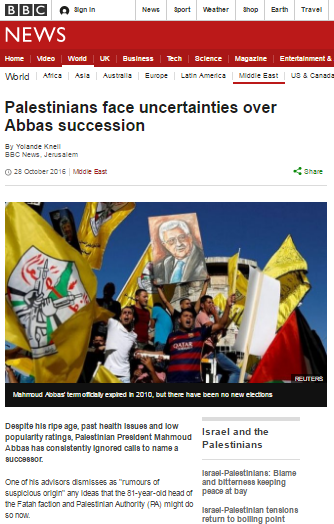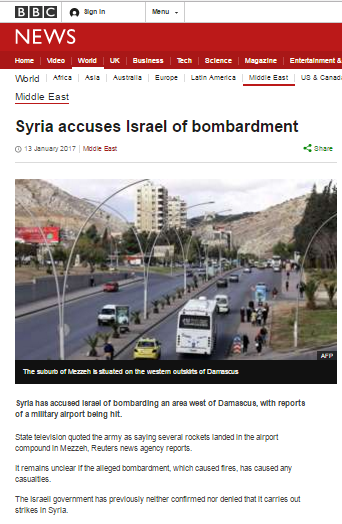As readers may recall, in October 2016 the BBC Jerusalem bureau’s Yolande Knell produced an article on the topic of succession within the Palestinian Authority which was notable for its lack of information concerning internal Fatah rivalries.
“Knell’s staid portrayal of the issue of who will succeed Mahmoud Abbas in his role as president of the Palestinian Authority (as well as chair of the PLO and head of the Fatah party) is most notable for what is absent from her framing of the story. Given that BBC audiences suffer from a chronic lack of information concerning internal Palestinian affairs, it is of course highly unlikely that they would be able to read between Knell’s lines and fill in the blanks for themselves.”
Since the appearance of that article, the BBC has failed to produce any follow-up English language reporting on subsequent related events – including violent clashes between supporters of Abbas and Dahlan, Abbas’ unanimous re-election as head of the Fatah party or the seventh Fatah party congress.
In her October report Knell named several potential successors to Abbas.
“For Palestinians, the most popular of the [Fatah Central] committee’s 20 members is Marwan Barghouti, who led Fatah’s Tanzim militant group during the last uprising against the occupation, or intifada.
Although he is in jail in Israel, serving five life terms for involvement in murdering Israelis, he remains influential and has led efforts to end divisions with Hamas.”
She also mentioned “[t]hree other potentially important players”: Mohammed Dahlan, Jibril Rajoub and Majed Faraj.
The fact that the BBC chose not to cover the seventh Fatah party congress in December means that audiences remain unaware of the fact that Barghouti received the most votes in the election to the Central Council of the faction which dominates the Palestinian Authority as well as the PLO (the body supposed to conduct negotiations with Israel) and that the second most popular candidate was Jibril Rajoub.
In mid-February the Fatah central committee elected a new vice-chairman and secretary-general to one-year terms.
“Former Nablus governor Mahmoud al-Aloul was appointed as the first ever vice president of the ruling Palestinian Fatah movement Wednesday night, marking him as a possible candidate to succeed Mahmoud Abbas as Palestinian Authority president.
Aloul, 67, appointed by the Fatah Central Committee, is a close confidant of the 82-year-old Abbas. He is considered popular within the party, and was a long-time leader of Fatah’s armed wing before following the group’s leadership from Tunis to the West Bank in 1995 in the wake of the Oslo Accords. […]
Another possible successor to Abbas to emerge Wednesday night was the head of the Palestinian Football Association, Jibril Rajoub, who was appointed secretary general of the 18-member Fatah Central Committee. […]
Previously, the secretary general and vice president of the Fatah central committee was one position, but it was decided to split it into two. Palestinian commentators assessed that Rajoub may have cut a deal with Aloul to split the position.
The appointments are due to be reviewed in a year.”
Analysts viewed the appointments as a blow to the possibility of Marwan Barghouti succeeding Mahmoud Abbas:
“Though Barghouti won the most votes during the Seventh Fatah Congress in December, the decision not to appoint him to any role Wednesday night is seen as an attempt to distance him from holding any office that would put him in line to succeed Abbas.
Some in Barghouti’s circle expressed concern in recent days that the Fatah central committee would deny him an appointment, according to anonymous statements given to Arab media.
Currently, Barghouti’s future in Fatah is unclear. According to his close associates, Barghouti agreed to participate in the Seventh Fatah Congress only after Abbas promised him the deputy position.”
The Jerusalem Post adds:
“Other important portfolios were also distributed to various committee members with the noticeable exception of Marwan Barghouti. Many in the party had expected the longtime Fatah leader to receive some form of recognition, and possibly the vice chairmanship.”
Although the appointment of Mahmoud al-Aloul does not qualify him as Abbas’ successor, it does introduce a new name to the list of possibilities.
“Grant Rumley, a fellow at the Foundation for the Defense of Democracies, told the [Jerusalem] Post that while Aloul’s election may not be a game changer in terms of succession, it does introduce a new contender.
“By virtue of his new position as No. 2 in Fatah, Aloul cannot be ignored or discounted in the race to replace Abbas,” Rumley said.
After Aloul completes his one-year term as vice chairman, the central committee will either extend Aloul’s term or vote for a new vice chairman.”
However, with the BBC Jerusalem bureau’s chronic under-reporting of Palestinian affairs continuing, audiences remain in the dark with regard to these developments and their possible implications. The fact that Fatah dominates the PLO and the foreign donor funded Palestinian Authority means that its internal politics clearly have significant effect on what the BBC terms “the Middle East peace process”. BBC audiences, however, continue to be deprived of the information which would enhance their understanding of that particular “international issue“.
Related Articles:
BBC’s Knell omits back stories in portrayal of PA succession
BBC News continues to under-report internal Palestinian politics
Abbas’ Fatah reelection ignored by the BBC – in English
BBC News passes up coverage of recent Fatah congress
BBC News silent on Abbas’ rejection of Jewish state




